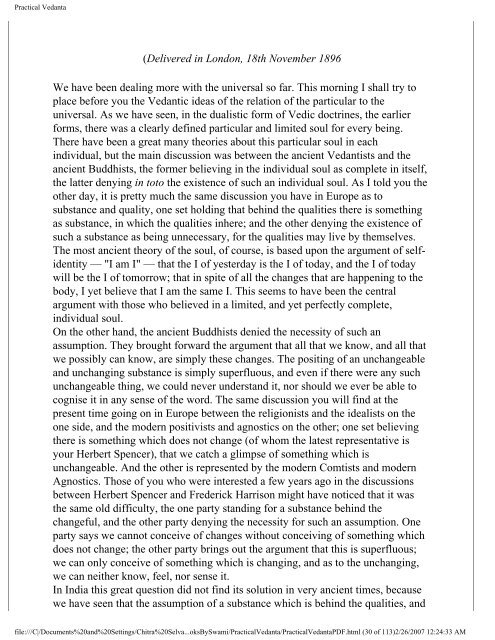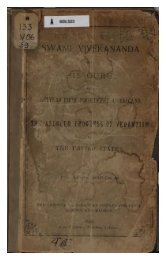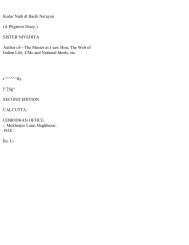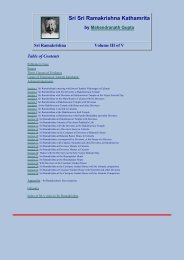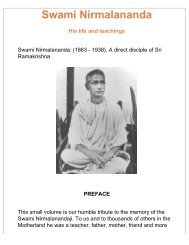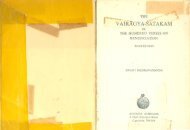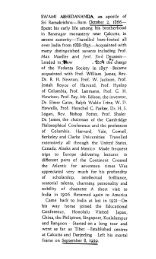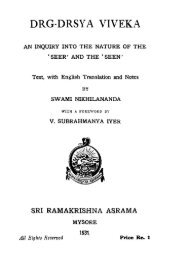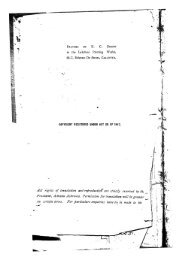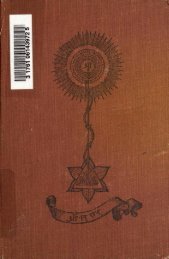<strong>Practical</strong> <strong>Vedanta</strong>(Delivered in London, 18th November 1896We have been dealing more with the universal so far. This morning I shall try toplace before you the Vedantic ideas of the relation of the particular to theuniversal. As we have seen, in the dualistic form of Vedic doctrines, the earlierforms, there was a clearly defined particular and limited soul for every being.There have been a great many theories about this particular soul in eachindividual, but the main discussion was between the ancient Vedantists and theancient Buddhists, the former believing in the individual soul as complete in itself,the latter denying in toto the existence of such an individual soul. As I told you theother day, it is pretty much the same discussion you have in Europe as tosubstance and quality, one set holding that behind the qualities there is somethingas substance, in which the qualities inhere; and the other denying the existence ofsuch a substance as being unnecessary, for the qualities may live by themselves.The most ancient theory of the soul, of course, is based upon the argument of selfidentity— "I am I" — that the I of yesterday is the I of today, and the I of todaywill be the I of tomorrow; that in spite of all the changes that are happening to thebody, I yet believe that I am the same I. This seems to have been the centralargument with those who believed in a limited, and yet perfectly complete,individual soul.On the other hand, the ancient Buddhists denied the necessity of such anassumption. They brought forward the argument that all that we know, and all thatwe possibly can know, are simply these changes. The positing of an unchangeableand unchanging substance is simply superfluous, and even if there were any suchunchangeable thing, we could never understand it, nor should we ever be able tocognise it in any sense of the word. The same discussion you will find at thepresent time going on in Europe between the religionists and the idealists on theone side, and the modern positivists and agnostics on the other; one set believingthere is something which does not change (of whom the latest representative isyour Herbert Spencer), that we catch a glimpse of something which isunchangeable. And the other is represented by the modern Comtists and modernAgnostics. Those of you who were interested a few years ago in the discussionsbetween Herbert Spencer and Frederick Harrison might have noticed that it wasthe same old difficulty, the one party standing for a substance behind thechangeful, and the other party denying the necessity for such an assumption. Oneparty says we cannot conceive of changes without conceiving of something whichdoes not change; the other party brings out the argument that this is superfluous;we can only conceive of something which is changing, and as to the unchanging,we can neither know, feel, nor sense it.In India this great question did not find its solution in very ancient times, becausewe have seen that the assumption of a substance which is behind the qualities, andfile:///C|/Documents%20and%20Settings/Chitra%20Selva...oksBySwami/<strong>Practical</strong><strong>Vedanta</strong>/<strong>Practical</strong><strong>Vedanta</strong>PDF.html (30 of 113)2/26/2007 12:24:33 AM
<strong>Practical</strong> <strong>Vedanta</strong>which is not the qualities, can never be substantiated; nay, even the argument fromself-identity, from memory, — that I am the I of yesterday because I remember it,and therefore I have been a continuous something — cannot be substantiated. Theother quibble that is generally put forward is a mere delusion of words. Forinstance, a man may take a long series of such sentences as "I do", "I go", "Idream", "I sleep", "I move", and here you will find it claimed that the doing,going, dreaming etc., have been changing, but what remained constant was that"I". As such they conclude that the "I" is something which is constant and anindividual in itself, but all these changes belong to the body. This, thoughapparently very convincing and clear, is based upon the mere play on words. The"I" and the doing, going, and dreaming may be separate in black and white, but noone can separate them in his mind.When I eat, I think of myself as eating — am identified with eating. When I run, Iand the running are not two separate things. Thus the argument from personalidentity does not seem to be very strong. The other argument from memory is alsoweak. If the identity of my being is represented by my memory, many thingswhich I have forgotten are lost from that identity. And we know that people undercertain conditions forget their whole past. In many cases of lunacy a man willthink of himself as made of glass, or as being an animal. If the existence of thatman depends on memory, he has become glass, which not being the case wecannot make the identity of the Self depend on such a flimsy substance asmemory. Thus we see that the soul as a limited yet complete and continuingidentity cannot be established as separate from the qualities. We cannot establish anarrowed-down, limited existence to which is attached a bunch of qualities.On the other hand, the argument of the ancient Buddhists seems to be stronger —that we do not know, and cannot know, anything that is beyond the bunch ofqualities. According to them, the soul consists of a bundle of qualities calledsensations and feelings. A mass of such is what is called the soul, and this mass iscontinually changing.The Advaitist theory of the soul reconciles both these positions. The position ofthe Advaitist is that it is true that we cannot think of the substance as separatefrom the qualities, we cannot think of change and not-change at the same time; itwould be impossible. But the very thing which is the substance is the quality;substance and quality are not two things. It is the unchangeable that is appearingas the changeable. The unchangeable substance of the universe is not somethingseparate from it. The noumenon is not something different from the phenomena,but it is the very noumenon which has become the phenomena. There is a soulwhich is unchanging, and what we call feelings and perceptions, nay, even thebody, are the very soul, seen from another point of view. We have got into thehabit of thinking that we have bodies and souls and so forth, but really speaking,there is only one.When I think of myself as the body, I am only a body; it is meaningless to say Iam something else. And when I think of myself as the soul, the body vanishes, andfile:///C|/Documents%20and%20Settings/Chitra%20Selva...oksBySwami/<strong>Practical</strong><strong>Vedanta</strong>/<strong>Practical</strong><strong>Vedanta</strong>PDF.html (31 of 113)2/26/2007 12:24:33 AM
- Page 1 and 2: Practical VedantaPractical VedantaP
- Page 3 and 4: Practical Vedantaworld. If I am a s
- Page 5 and 6: Practical Vedantadifference is only
- Page 7 and 8: Practical VedantaThe ideal of faith
- Page 9 and 10: Practical Vedantamoment of our live
- Page 11 and 12: Practical Vedantaof the Christs and
- Page 13 and 14: Practical Vedanta"This life is Brah
- Page 15 and 16: Practical Vedantadark fifteen days,
- Page 17 and 18: Practical Vedantalife. This is the
- Page 19 and 20: Practical Vedantaeverything would b
- Page 21 and 22: Practical Vedantait is only through
- Page 23 and 24: Practical Vedantawhich is that subt
- Page 25 and 26: Practical Vedantanoumenon and pheno
- Page 27 and 28: Practical Vedantato which is the be
- Page 29: Practical VedantaAbsolute.The finit
- Page 33 and 34: Practical Vedantaexperience that th
- Page 35 and 36: Practical Vedantafulfilled. The Jiv
- Page 37 and 38: Practical Vedantabetween the pure r
- Page 39 and 40: Practical Vedantacome out straight.
- Page 41 and 42: Practical Vedantawar with one anoth
- Page 43 and 44: Practical Vedantanobody could under
- Page 45 and 46: Practical VedantaMy idea, therefore
- Page 47 and 48: Practical Vedantathe same methods.
- Page 49 and 50: Practical Vedantavarious minds, all
- Page 51 and 52: Practical Vedantabrotherhood; but t
- Page 53 and 54: Practical Vedantabrotherhood, but w
- Page 55 and 56: Practical Vedantawe all go with ves
- Page 57 and 58: Practical Vedantareason. What can y
- Page 59 and 60: Practical Vedantabeen preached in t
- Page 61 and 62: Practical Vedantathe husband kisses
- Page 63 and 64: Practical Vedantaof the knowledge a
- Page 65 and 66: Practical Vedantafor those who only
- Page 67 and 68: Practical Vedantasun exists because
- Page 69 and 70: Practical Vedantaof death was pleas
- Page 71 and 72: Practical VedantaGod. We must learn
- Page 73 and 74: Practical Vedantaa plague comes, it
- Page 75 and 76: Practical VedantaAtman? "As with a
- Page 77 and 78: Practical Vedantathat immortal One,
- Page 79 and 80: Practical Vedantaand the third egoi
- Page 81 and 82:
Practical VedantaWitness of the uni
- Page 83 and 84:
Practical VedantaPractical Vedanta1
- Page 85 and 86:
Practical Vedantaeternal ; every ot
- Page 87 and 88:
Practical Vedantafaculty, Buddhi, w
- Page 89 and 90:
Practical VedantaPractical Vedanta1
- Page 91 and 92:
Practical Vedantastepping-stone to
- Page 93 and 94:
Practical Vedantarecognition? Findi
- Page 95 and 96:
Practical Vedantasentient." This is
- Page 97 and 98:
Practical Vedantaessentially differ
- Page 99 and 100:
Practical Vedantaexistence is limit
- Page 101 and 102:
Practical Vedantalive, for I am lif
- Page 103 and 104:
Practical Vedantasee from Kapila's
- Page 105 and 106:
Practical Vedantalimitation, but th
- Page 107 and 108:
Practical Vedantaperfect, infinite,
- Page 109 and 110:
Practical Vedantaindividuality, of
- Page 111 and 112:
Practical Vedantarepeat [something]
- Page 113:
Practical Vedantaperson who dies in


